DCPA NEWS CENTER
Enjoy the best stories and perspectives from the theatre world today.
Enjoy the best stories and perspectives from the theatre world today.
This article was published on September 30, 2018

Tyne Daly starred in the celebrated inaugural DCPA Theatre Company production of ‘The Caucasian Chalk Circle’ to launch the 1979-80 season, but she did not finish the run.
When the Denver Center Theatre Company debuted on New Year’s Eve 1979 with the first of three plays opening on successive nights, Tyne Daly was not yet Tyne Daly. She was a 33-year-old mother of two still three years from becoming a household name on TV’s “Cagney & Lacey.”
Not that she was unknown. Daly already had an Emmy Award nomination for her supporting work in the 1977 TV movie Intimate Strangers and was well-known in the Los Angeles theatre scene. But she auditioned at an open casting call in Los Angeles alongside dozens of others hoping to win one of a whopping 40 jobs in the Denver Center’s inaugural resident company of actors who would christen the new $13 million Helen Bonfils Theatre Complex.
Daly won over founding DCTC Artistic Director Edward Payson Call, who cast her in the lead role of Grusha in Bertolt Brecht’s The Caucasian Chalk Circle and as Pip in Orson Welles’ Moby Dick Rehearsed. She joined a company that included fellow future stars Tandy Cronyn and Delroy Lindo alongside prominent Denver actors such as Jamie Newcomb, the intentionally lower-cased donnie l. betts and Jerry Webb. In coming seasons, they would be joined by Mercedes Ruehl and Annette Bening, among others.
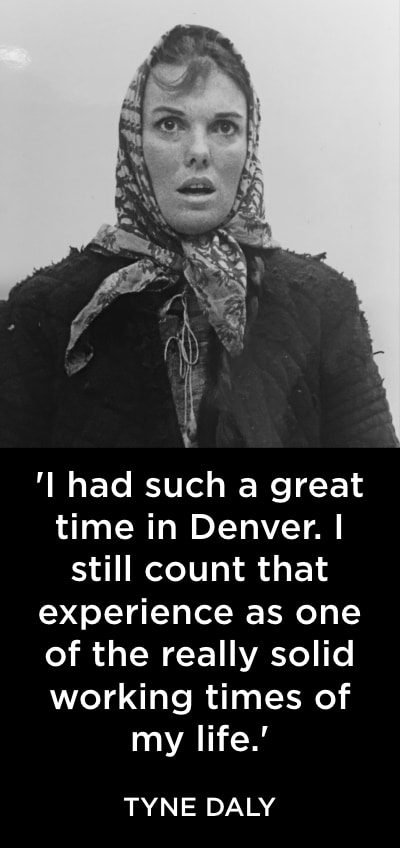 Daly was raising two daughters with Cuban actor Georg Stanford Brown (star of TV’s “The Rookies”) at the time. Why was she willing leave her young family behind in L.A. for an extended stay in Denver when she surely didn’t need to take the job? The question makes her laugh.
Daly was raising two daughters with Cuban actor Georg Stanford Brown (star of TV’s “The Rookies”) at the time. Why was she willing leave her young family behind in L.A. for an extended stay in Denver when she surely didn’t need to take the job? The question makes her laugh.
“Oh I absolutely did have to take the job,” Daly told the DCPA NewsCenter on the eve of her recent return to TV in the new “Murphy Brown.” “I wasn’t a personage of any kind at the time. I was a journeyman television guest star. It was hard for me to leave my kiddies behind with their dad. But in those days, if you wanted to be an actor, you had to be a juggler. So I juggled. I remember other actors brought their wives and children to Denver, and I was so jealous. But my girls were 12 and 9 at the time and they had school.”
Daly wanted the five-month Denver contract because she knew of Call’s reputation at the Guthrie Theatre in Minneapolis. Despite her early success in television, Daly said, “I was always a theatre animal.” And Call handed her an enormously appealing slate of roles. “For the opportunity to stretch from playing a Russian peasant girl in The Caucasian Chalk Circle to an 18th-century actress who plays the role of Pip in Moby Dick Rehearsed felt to me like I was being finally accredited as an actress with some scope,” Daly said.
The DCTC was a true repertory company back then, meaning all 40 actors appeared in The Caucasian Chalk Circle, and then they were then divided up for alternating performances of Moby Dick Rehearsed and Molière’s The Learned Ladies.
A night for Denver’s history books
The three-day celebration culminated on a Wednesday night with a gala for Denver’s history books, with celebrities in attendance ranging from Lucille Ball to Denver native Douglas Fairbanks Sr. to Jimmy Stewart to Lynn Fontanne to Leonard Nimoy, most of whom were lured to the festivities by Denver Center founder Donald R. Seawell to see legendary actor Henry Fonda receive the American National Theatre and Academy’s prestigious National Artists’ Award. It was the first time the honor ever had been presented outside of New York or Los Angeles.
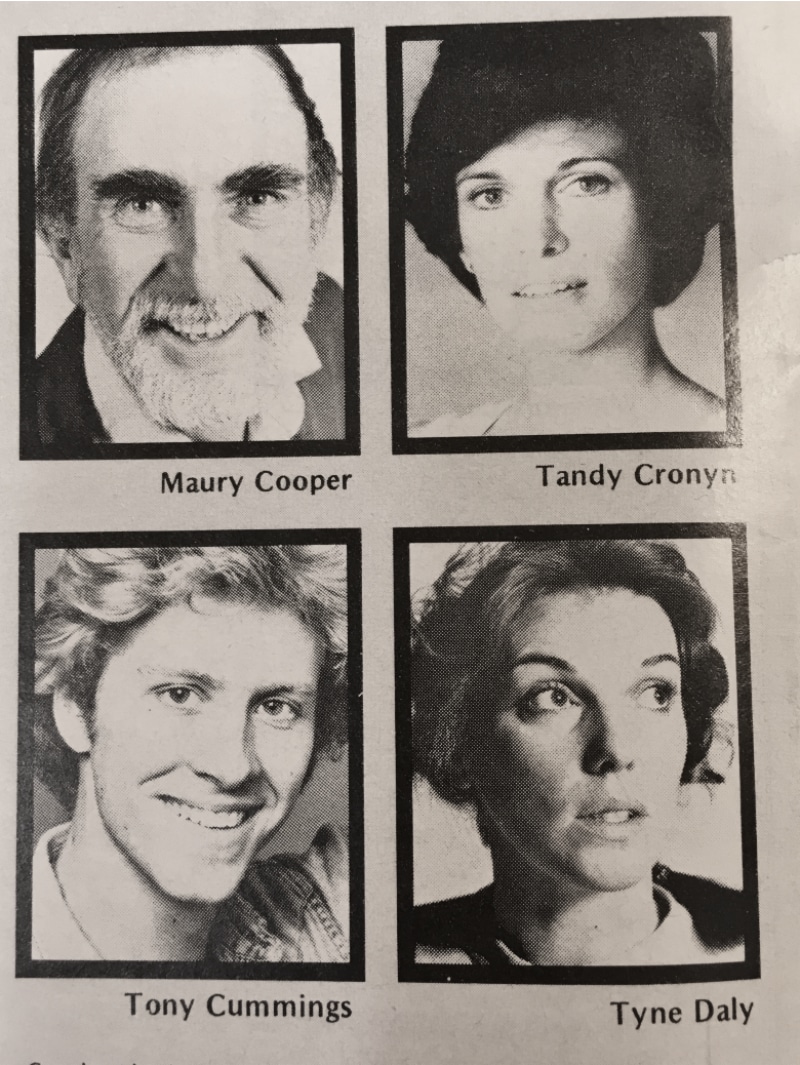
From the Denver Center Theatre Company program in 1979-80.
Even the press corps harbored its own rising star: Molly Ivins was here reporting on the event for The New York Times. She described the atmosphere as “healthily frantic,” and said the opening of the DCPA signaled Denver’s entrance into the theatrical big leagues. That no doubt pleased Seawell, who for months had trumpeted the opening as the start of no less than “The Denver Decade in the American Theatre.” That was the absolute expectation – and there were signs trumpeting the claim all over the complex.
Newcomb (most recently seen in the DCPA Theatre Company’s All the Way) and fellow company actor Darrie Lawrence (Appoggiatura) were fully star struck. Lawrence describes the atmosphere as “a shiver of expectation and excitement.”
The crowd that gathered for Fonda’s dinner was so full, Newcomb said, the actors had to eat backstage by the dressing rooms. Lawrence was charmed enough just to be eating with her castmate, Daly. “To me, Tyne already was Hollywood royalty,” Lawrence said – not only for her TV and stage credits to date but because of her husband (Brown), older brother Tim Daly (“Wings”) and father James Daly (“Medical Center“).
“We were eating with Tyne when she saw that Henry Fonda was starting to leave,” said Newcomb. “So she says, ‘I gotta go!’ and she just literally flew over and caught him.” Daly remembers Fonda complimenting her work in Moby Dick Rehearsed. “I still cite that,” she said with a laugh.
Those who saw Daly’s performance in The Caucasian Chalk Circle speak about it in resplendent terms. DCPA Chairman Martin Semple, then the company’s outside legal counsel, still considers The Caucasian Chalk Circle to be the most remarkable production in the DCPA Theatre Company’s 40-year history. “I was blown away,” Semple said. “I thought that play was as good as anything I had ever seen in New York or London, and I knew then that we had something really special here in Denver.”
(Story continues below the photo.)
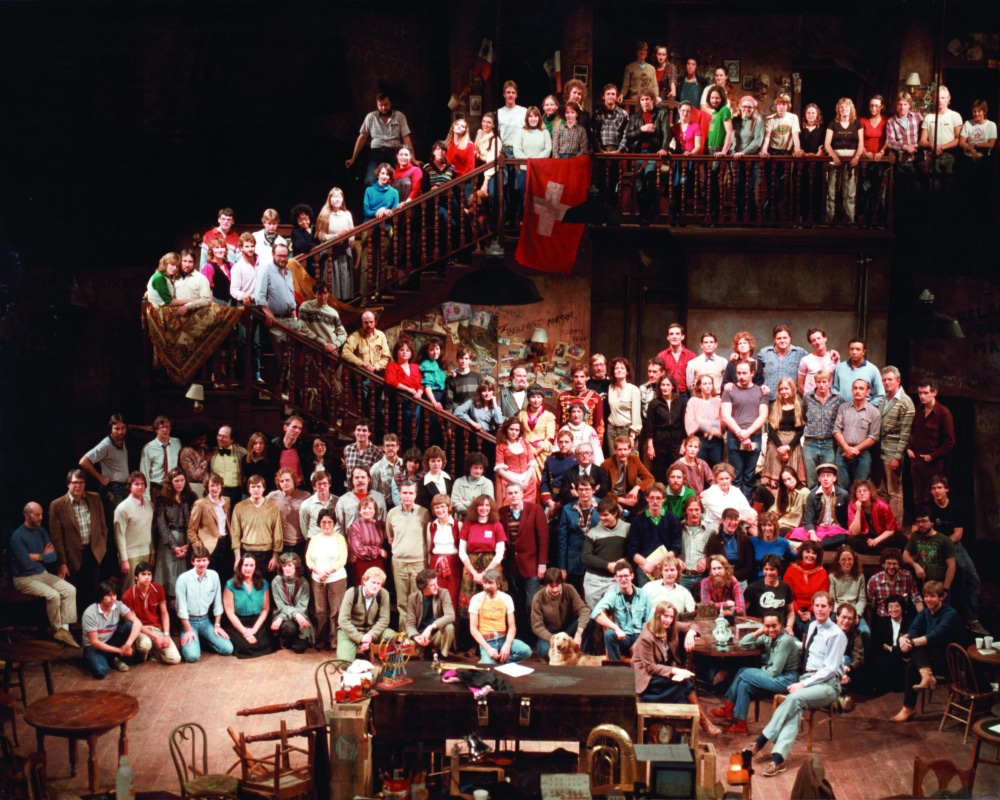
The inaugural DCTC resident acting cast and crew in 1979.
Juliet Wittman, the longtime theatre critic for Westword, was an audience member during that inaugural run, and years later she wrote: “In my life, there have been a few theatrical events that I felt privileged to have experienced and that lodged in my heart forever – and one of them was Tyne Daly in the Denver Center’s first-ever production of The Caucasian Chalk Circle.”
Also among the audience were the two guardians of Brecht’s estate, who left impressed.
“There is a lyric in the show that says, ‘Your father was a pimp, your mother is a whore, and all good children should come to war’ – and they said they thought Brecht would have approved of my delivery of that,” Daly said. “That will keep an actor going for about a year and a half.”
An abrupt curtain call
Daly freely admits that her work in The Caucasian Chalk Circle neither began nor ended well. Call, who turned 90 in August, was already a director of international repute. In 1965, he had directed a seminal production of The Caucasian Chalk Circle starring Zoe Caldwell at The Guthrie Theatre in Minneapolis, and he was hoping to re-create that magic in Denver with Daly.
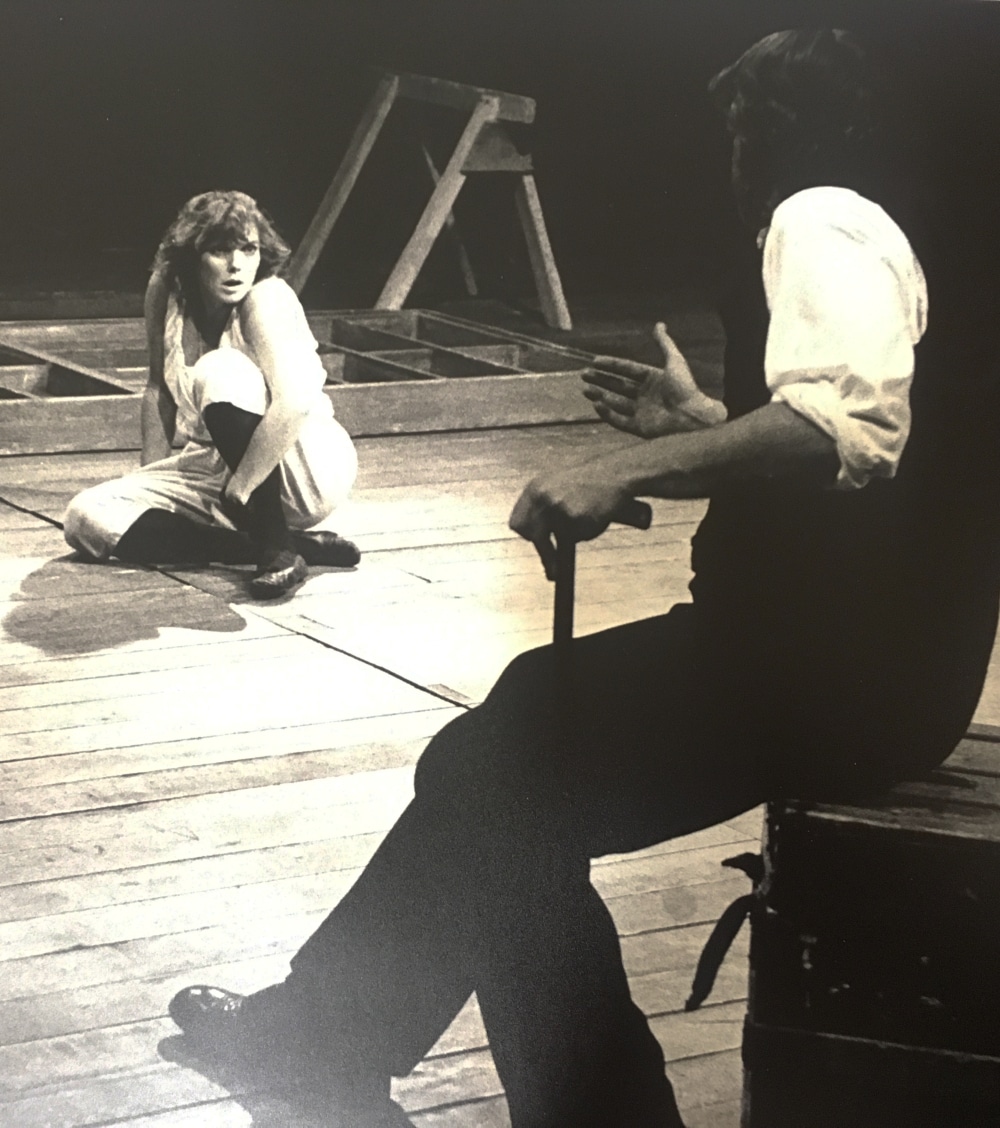
Tyne Daly during the 1979-80 season.
The Caucasian Chalk Circle, written by Brecht in 1948, is a parable about a peasant girl who rescues a baby and becomes a better mother than its wealthy natural parents. It is a play-within-a-play based on a Chinese folk tale that Brecht set in (then) present-day Russian Georgia, where Noah was said to have landed the Ark, where Jason sought the Golden Fleece and where Prometheus was chained to a rock.
In the immediate aftermath of World War II, Call saw the play not as a picture of Soviet collectivism but as a renewal of the area’s ancient values after the holocaust of war. Brecht said the central couple of Grusha and Azdak personified renewal and goodness in a dark world. But Daly felt she could never measure up to Caldwell, now a four-time Tony Award-winning actor. (Daly has since won six Emmy Awards, one Tony Award and has been inducted into the American Theatre Hall of Fame.)
“Ed Payson Call was an ideal of mine. He was a terrific director who knew that play backward and forward,” Daly said. “Zoe Caldwell was another ideal of mine. But I felt like I had her ghost to deal with the whole time. We stumbled a little bit in the beginning, and after four weeks of rehearsal, I asked Ed if we could have coffee. I said to him: ‘Ed, I have tried all this time to give you my very, very best Zoe Caldwell. But I’m not Zoe Caldwell. Now, can I be in the play?’ And so we found that middle ground between my complete innocence of the play and his deep knowledge of it. And we made it a success.”
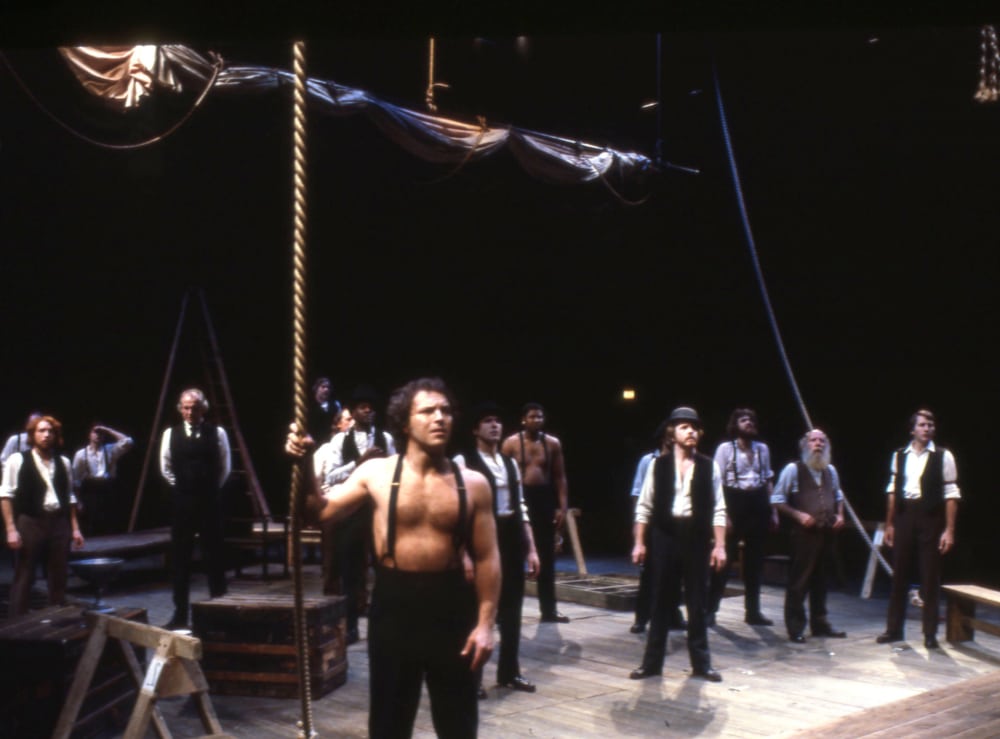
Moby Dick Rehearsed.
Daly admits to far more enjoying her experience in Moby Dick Rehearsed, which also was first intended to be directed by Call. But as rehearsals approached, he knew it would be too much so he handed the reigns to William Woodman. “I still love Moby Dick Rehearsed to the bottom of my feet,” Daly said. “I think it’s such a terrific play.”
But shortly after both plays opened, Daly took a consequential phone call from her agent. She had been offered a supporting role in a TV movie called The Women’s Room starring Lee Remick. Daly would play a suburban wife who realizes two of her best friends are sleeping with her husband. Daly accepted.
“I quit one job to do another one, and that’s the first time I’d ever done that,” Daly said. “It was painful. Ed was furious at me. He said I was letting down the theatre forever and shamed me. I felt bad about it.”
Before leaving Denver, Daly walked understudy Karen Landry through both roles. But because she had to depart so abruptly, Daly had to leave her VW bug behind in Denver. When filming on the movie was complete, she flew back to Denver to retrieve her car. Both plays were still running, so she saw them. “It was sort of like Tom Sawyer at his own funeral,” Daly said. “I had to have one bracing drink before I went in to see The Caucasian Chalk Circle — and I loved it.” Landry, who would go on to a significant stage and screen career of her own before her death in 2016, made an impression on Daly. “She did some wonderful things with the part,” Daly said. “I remember thinking, ‘Look at that! Why didn’t Ed tell me to do that?’ I had fits of terrible jealousy.”
(Story continues below the photo.)
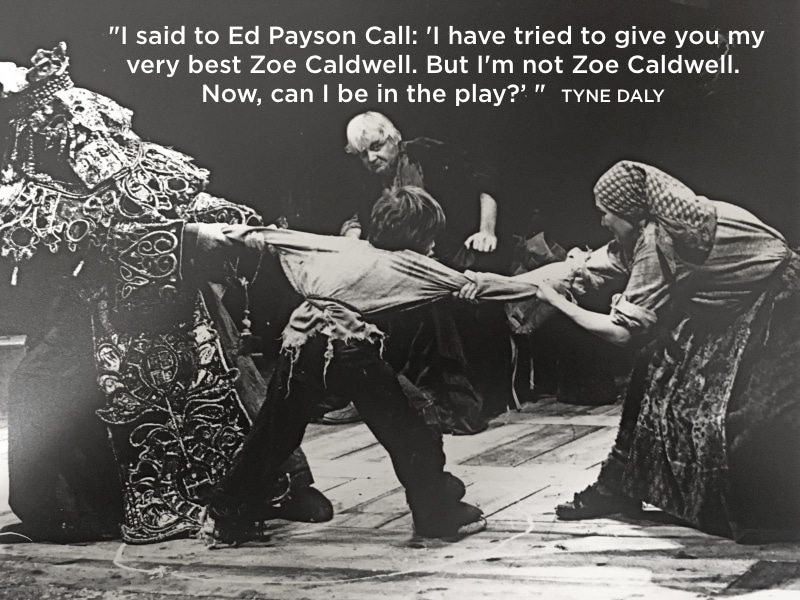
Tyne Daly in ‘The Caucasian Chalk Circle.’
Daly still has fond memories of her time Denver, especially being housed at the swank Brown Palace Hotel. “That is still one of my favorite hotels ever,” she said. She remembers a trysting couch in the atrium, the vaunted stained-glass windows and marble in every color. She also remembers forgetting to warn her young daughters about a perilous scene that took place on a bridge in The Caucasian Chalk Circle. “Grusha falls through a breakaway step while holding the baby, and it scared the poop out of my girls,” she said.
Looking back, Daly said she fully appreciated back in 1979 what an ambitious undertaking the new Denver Center was, “and the proof of that is that they’re going still,” she said.
“I had such a great time in Denver,” she added. “I am sorry that I let Ed Call down, but I do still count that experience as one of the really solid working times of my life where I learned an enormous amount from people who knew more than me. I’m 72 years old now, and I’m still trying to be in rooms where people are smarter and funnier and quicker and more inventive than I am. That’s what keeps it fun.”
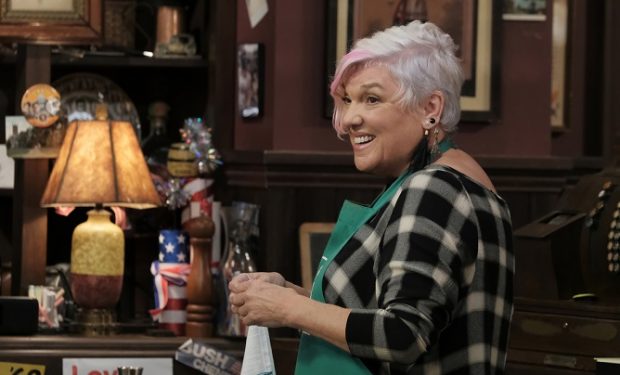
Tyne Daly as Phyllis on ‘Murphy Brown.’ Photo by Jojo Whilden/CBS
On returning to “Murphy Brown“ playing Phil’s bar-owning sister, Phyllis: “Once again I’m in a room with people who are smarter and funnier and more experienced than I am. This kind of TV is sort of a bastard form of theatre, because there is a live audience and there are actors playing scenes. But in between is this huge line of machines, technicians and all sorts of other people. So it’s different. We’ll see what the traffic will allow.” (“Murphy Brown” airs at 8:30 p.m. MDT on CBS.)
On why she prefers live theatre to TV: “Theatre is meant to galvanize whatever community you are in. You are all in the same room together sharing something. I love that in the theatre, I am in the same room with the people I’m telling the story to. If I’m watching on TV, I’m at home and also doing the laundry or napping. I’m a romantic, but I love that you don’t record theatre performances. And yet if we actors have done our job, we will still leave the audience with something that I don’t think ever goes away.”
On working with Denver native and George Washington High School graduate Sierra Boggess in the Broadway play Master Class: “Oh, she’s a doll face. First of all, she’s amazingly talented. Second of all, the assignment she had with me in Master Class was as foreign to her as playing Maria Callas was to me. So with the help of our wonderful director Stephen Wadsworth, we really plumbed some depths. Sierra is a terrific lady, and the only thing I hold against her is that she’s totally tied to all of her electronic devices. She’s a 21st-century actor, and it’s hard for 21st-century actors to be friends with an 18th-century actor — which is me!”
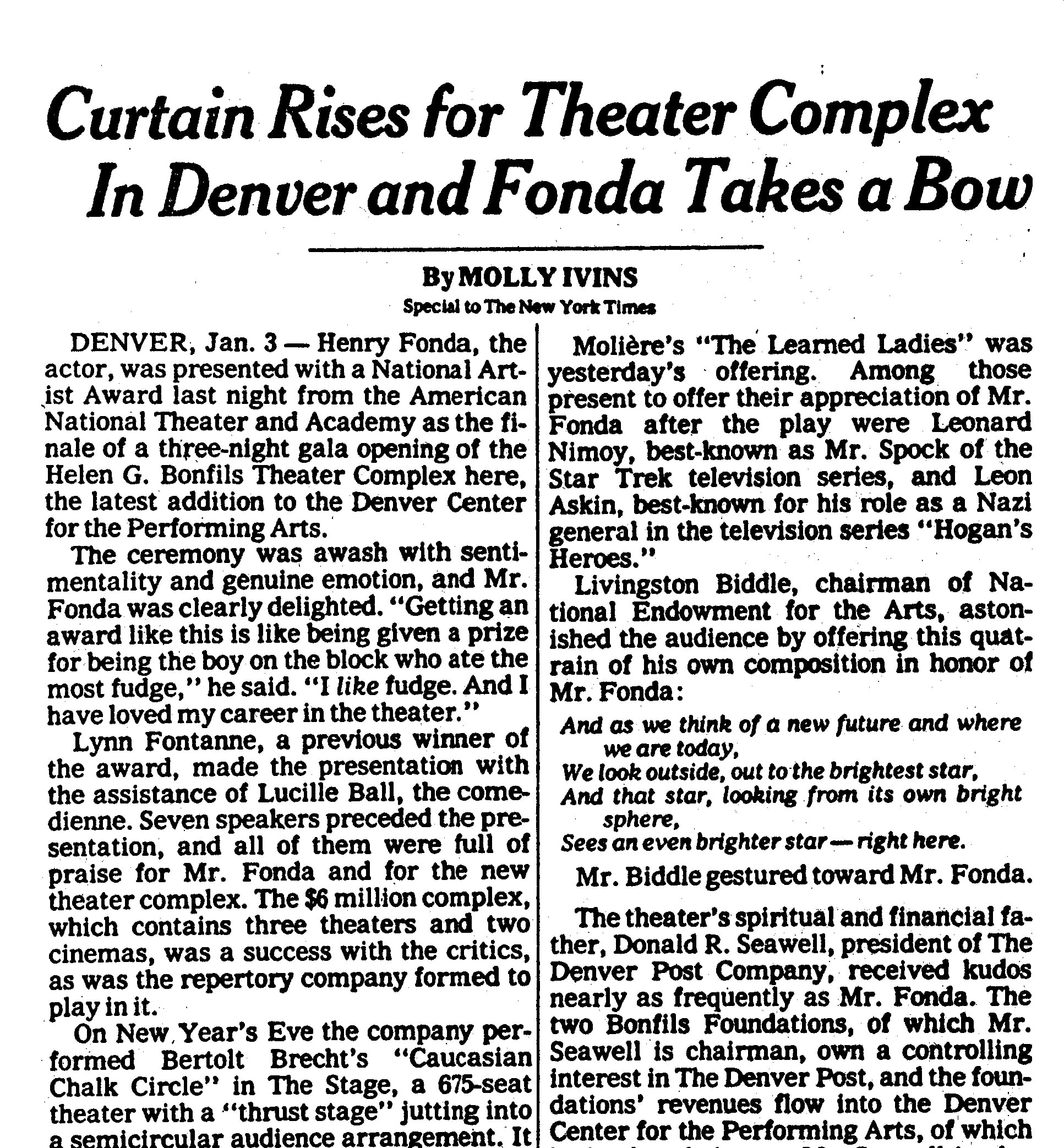
One of Molly Ivins’ reports from the opening off the DCPA for The New York Times
